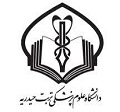(2019) بررسی اثرات موکوس شقایق دریایی (Stichodactyla haddoni )بر رده سلولی PC3 سرطان پروستات. Journal of Torbat Heydariyeh University of Medical Sciences. pp. 34-43.
|
Text
3.pdf Download (307kB) |
Persian Abstract
زمینه و هدف: سرطان پروستات یکی از شایع­ترین بدخیمی­های سیستم ادراری مردان و هم­چنین دومین علت مرگ­ و ­میر ناشی از سرطان در مردان است. در مطالعه حاضر اثرات موکوس شقایق دریایی Stichodactyla haddoni  بر میزان بقای سلول­ های سرطانی پروستات (PC3) مورد بررسی قرار گرفت. روش­ ها: در این مطالعه نیمه تجربی، نمونه­ برداری از شقایق دریایی به صورت تصادفی و با استفاده از کلید شناسایی صورت گرفت. سپس تغلیظ موکوس­ خام بدست آمده از شقایق دریایی S. haddoni با استفاده از استون انجام شد. سلو­ل ­های رده سرطانی PC3 با غلظت­های مختلف موکوس­ خام (20، 40، 60، 80، 100 و 120 میکروگرم بر میلی­لیتر) و داروی ضدسرطان دوکسوروبیسین (06/0، 25/0 و 5/0 میکروگرم بر میلی­لیتر) به­ عنوان شاهد مثبت به مدت 24 و 48 ساعت تیمار شدند. اثر تیمارها بر میزان بقای سلولی با استفاده از تست MTT ارزیابی شد. میزان IC50  24 و 48 ساعته تیمارها محاسبه گردید. نتایج: اثرات موکوس خام شقایق دریایی S. haddoni بر رشد سلول­ های PC3 با افزایش دوز و زمان درمان (24 و 48 ساعت) افزایش یافت. داروی ضدسرطان دوکسوروبیسین در غلظت­ های مختلف بیشترین سمیت سلولی را نشان داد (0/001P=) که این اثر با غلظت­ های 100 و 120 میکروگرم بر میلی­لیتر موکوس­ خام برابر بود (0/082P=). غلظت­های 120 میکروگرم بر میلی­لیتر موکو س­خام و هم­چنین 0/5 میکروگرم بر میلی­لیتر دوکسوروبیسین منجر به کشتن کامل سلو ل­ های PC3 بعد از 48 ساعت شدند (0/001P=). نتیجه­ گیری: موکوس­ خام مستخرج از شقایق دریایی S. haddoni دارای اثرات سمیت سلولی و مهاری رشد بر سلول­های سرطانی PC3 می­باشد. بنابراین احتمالا می­ توان از آن به­ عنوان نامزد مناسبی برای استخراج داروهای ضدسرطان استفاده نمود.
Title
Investigating the effects of Sea anemone (Stichodactyla haddoni) mucus on prostate cancer PC3 cell line
Abstract
Background & Aim: Prostate cancer (PCa) is one of the most common cancers of the male urinary system and is also the second leading cause of cancer deaths in men. In the present study, the effects of Stichodactyla haddoni on the viability of prostate cancer cells (PC3) were investigated. Methods: In the semi experimental study, sea anemones were sampled at random using an identification key. Then concentration of crude mucus obtained from S. haddoni sea anemone was carried out by acetone. The PC3 cells treated with different concentrations of crude mucus (20, 40, 60, 80, 100 and 120 µg/ml) and Doxorubicin anticancer drug (0.06, 0.25 and 0.5 μg/ml) as a positive control for 24 and 48h. The effect of treatments on cell viability was evaluated using MTT assay. The IC50 of crude mucus was calculated after 24 and 48 h. Results: The inhibitory effects of the crude mucus of S. haddoni was increased with the growth of PC3 cells with escalating the dosage and treatment time (24 and 48h). The Doxorubicin anticancer drug induced the highest cytotoxicity at different concentrations, which was similar to the concentration of 100 and 120 µg/ml of crude mucus. Conclusion: The crude mucus of S. haddoni has cytotoxic and growth inhibitory effects on PC3 cancer cells, therefore, it can be considered as an appropriate candidate for the development of anticancer drugs.
| Item Type: | Article |
|---|---|
| Keywords: | Cnidarian Venoms, Prostatic Neoplasms,Sea anemone |
| Page Range: | pp. 34-43 |
| Journal or Publication Title: | Journal of Torbat Heydariyeh University of Medical Sciences |
| Journal Index: | ISC |
| Volume: | 7 |
| Number: | 2 |
| Publisher: | Torbat Heydariyeh University of Medical Sciences |
| Depositing User: | پریسا مرادی |
| URI: | http://eprints.thums.ac.ir/id/eprint/1971 |
Actions (login required)
 |
View Item |



